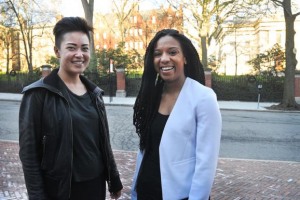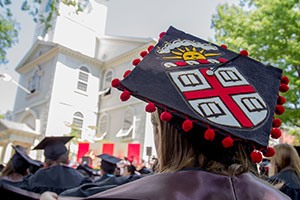Enslaved blacks had a tradition of intentionally passing down oral stories from generation to generation. And in the same spirit, many black scholars have paid close attention to the framing of our collective narrative around the world — the way our story is told.
So today, let’s think about what it means for us, Class of 2016, to be critical of the way our story is told. How do we tell the story of our time at Brown to ourselves and to others? We need to be critical of the narratives that simplify what was our Brown experience.
We need to focus in on the realities that could be erased by these simplifications. We need to be intentional about the stories we all carry with us. I recently heard someone — someone with very good intentions — narrate my story. She saw me as a strong black woman who managed to flawlessly commit to and obtain a degree in physics. She said: “There is just something so special about you.”
I wonder about the stories we tell — the pieces we erase with silence, and the pieces we carry with us. And while I am flattered that there may be people who see that as my story, I have to admit that that simplified version of my story erases way too much.
It does not lead to an understanding of Brown’s fundamental commitment to equality. That should be at the heart of my story. So let me tell you my Brown story as it really went down.
WATCH VIDEO: Senior Oration by Jamelle Watson-Daniels
I was just trying to feel at home. Now, that does not mean I wanted to make Brown resemble where I came from. See, I’m originally from a small town outside of St. Louis, Missouri. And the recipe for that “home” would be something like: St. Louis, plus rhythm and blues and some hip hop music, plus loving people laughing really loudly, plus my mom cooking up some of the world’s best macaroni and cheese — shout out to my mama!
But that is not what I mean by home.
See I was just trying to figure out what it would mean for there to be space for me to just be myself and at the same time be an affirmed and valued member of the Brown community. What it would feel like for me to be included. Meaning — space has been made for a person like me and will continue to exist over time. My story began with my search for that.
Which makes me wonder about the stories I tell. The pieces I could erase with silence, and the pieces I need to be sure to carry with me. As a first-year, I began gathering the tools I would need to feel at home. I knew I wanted to concentrate in physics, which meant I would spend most of my time going back and forth between Barus and Holley and the Sciences Library.
And when I searched only within the physics department, I found that space had not been made for a black woman like me — not in the larger international community of physicists, and certainly not here.
Fortunately, I did find a department that has made space for black women — Africana Studies. And in that space is where I observed and learned what it looks like for a black woman to be both affirmed and valued. Meaning included — meaning space has been made for people like me and will continue to exist over time.
So, in order to successfully complete a physics degree here at Brown, I would need to combine my degree with Africana Studies. And any narrative that I tell about my career trajectory as I continue on in science must not erase this truth, even when it is not the story people sometimes try to tell for me. You see, I wonder about the stories we tell. The pieces we erase with silence and the pieces we carry with us.
Another aspect that tends to be erased when my story is oversimplified is the role of my family and community. Today, many of us become a part of the first generation in our families to complete a bachelor’s degree, and this should not be erased from our stories.
To our families and communities, thank you. Thank you for the legacies of courage and pride; the strength to push through when we wanted to give up. The bravery to fight even harder when told we should give up. And love — so, so much love — when we could not find it here at Brown. And knowledge worth more than any of our student loans.
I don’t want our families and communities to be left out of any of the stories we tell.
You see the truth about my story is that most of Brown had not made space for people like me when I arrived on this campus. And even the space that I, and many of our peers here today, have tried to make for ourselves is not guaranteed to continue on once we leave.
For this reason, we have to be intentional about not erasing the pieces of our story that hold Brown accountable for being a home for all students alike. Mine is a story that aligns with our collective narrative as Brown students. Students who have spent the last few years learning about ourselves, but more importantly, about one another. Many of us, this year especially, have worked to make Brown a type of home for all.
We have worked to get closer to the vision that people from many different backgrounds and communities deserve a dedicated space at Brown carved out just for them.
When we look back at our time at Brown, Class of 2016, I wonder about the stories we will tell. Will we erase the painful realities with silence, or will we carry with us the true stories?
We should choose to carry with us stories that will continue to hold us accountable. Accountable to our collective commitment to human equality.
Class of 2016, let’s be intentional about the story we tell. Let us disrupt and challenge our narratives so that we might remain forever true.

